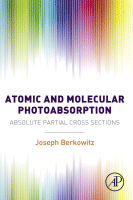Browse content
Table of contents
Actions for selected chapters
- Full text access
- Book chapterAbstract only
Chapter 1 - Alternative Designations of Absolute Partial Cross Sections
Pages 1-7 - Book chapterAbstract only
Chapter 2 - Atoms
Pages 9-105 - Book chapterAbstract only
Chapter 3 - Diatomic Molecules
Pages 107-238 - Book chapterAbstract only
Chapter 4 - Triatomic Molecules
Pages 239-390 - Book chapterAbstract only
Chapter 5 - Polyatomic Molecules
Pages 391-509 - Book chapterNo access
Index
Pages 511-518
About the book
Description
Atomic and Molecular Photoabsorption: Partial Cross Sections is a companion work to Joseph Berkowitz's earlier work, Atomic and Molecular Photoabsorption: Absolute Total Cross Sections, published with Academic Press in 2002.
In this work Joseph Berkowitz selected the "best" absolute partial cross sections for the same species as included in the companion work. A contrast, however, is that photoabsorption measurements, being of order I/Io, do not require the most intense light sources, whereas acquiring data on the products of light interactions with gaseous matter (ions, electrons, various coincidence measurements) has benefited significantly with the arrival of second- and third-generation synchrotrons. The newer devices have also extended the energy range of the light sources to include the K-shells of the species discussed here. The newer light sources encouraged experimentalists to develop improved instrumentation. Thus, the determination of partial cross sections continues to be an active field, with more recent results in some cases superseding earlier ones.
Where the accuracy of the absolute partial cross sections is deemed sufficient (less than five percent), numerical tables are included in this new work. In other cases, the available data are presented graphically.
Atomic and Molecular Photoabsorption: Partial Cross Sections is a companion work to Joseph Berkowitz's earlier work, Atomic and Molecular Photoabsorption: Absolute Total Cross Sections, published with Academic Press in 2002.
In this work Joseph Berkowitz selected the "best" absolute partial cross sections for the same species as included in the companion work. A contrast, however, is that photoabsorption measurements, being of order I/Io, do not require the most intense light sources, whereas acquiring data on the products of light interactions with gaseous matter (ions, electrons, various coincidence measurements) has benefited significantly with the arrival of second- and third-generation synchrotrons. The newer devices have also extended the energy range of the light sources to include the K-shells of the species discussed here. The newer light sources encouraged experimentalists to develop improved instrumentation. Thus, the determination of partial cross sections continues to be an active field, with more recent results in some cases superseding earlier ones.
Where the accuracy of the absolute partial cross sections is deemed sufficient (less than five percent), numerical tables are included in this new work. In other cases, the available data are presented graphically.
Key Features
- Includes data on atoms, diatomic molecules, triatomic molecules, and polyatomic molecules
- Written by world-leading pioneer in the field of photoionization mass spectrometry
- Very clear presentation of the useful, quantitative information in both tables and graphs
- Includes data on atoms, diatomic molecules, triatomic molecules, and polyatomic molecules
- Written by world-leading pioneer in the field of photoionization mass spectrometry
- Very clear presentation of the useful, quantitative information in both tables and graphs
Details
ISBN
978-0-12-801943-6
Language
English
Published
2015
Copyright
Copyright © 2015 Elsevier Ltd. All rights reserved.
Imprint
Academic Press
